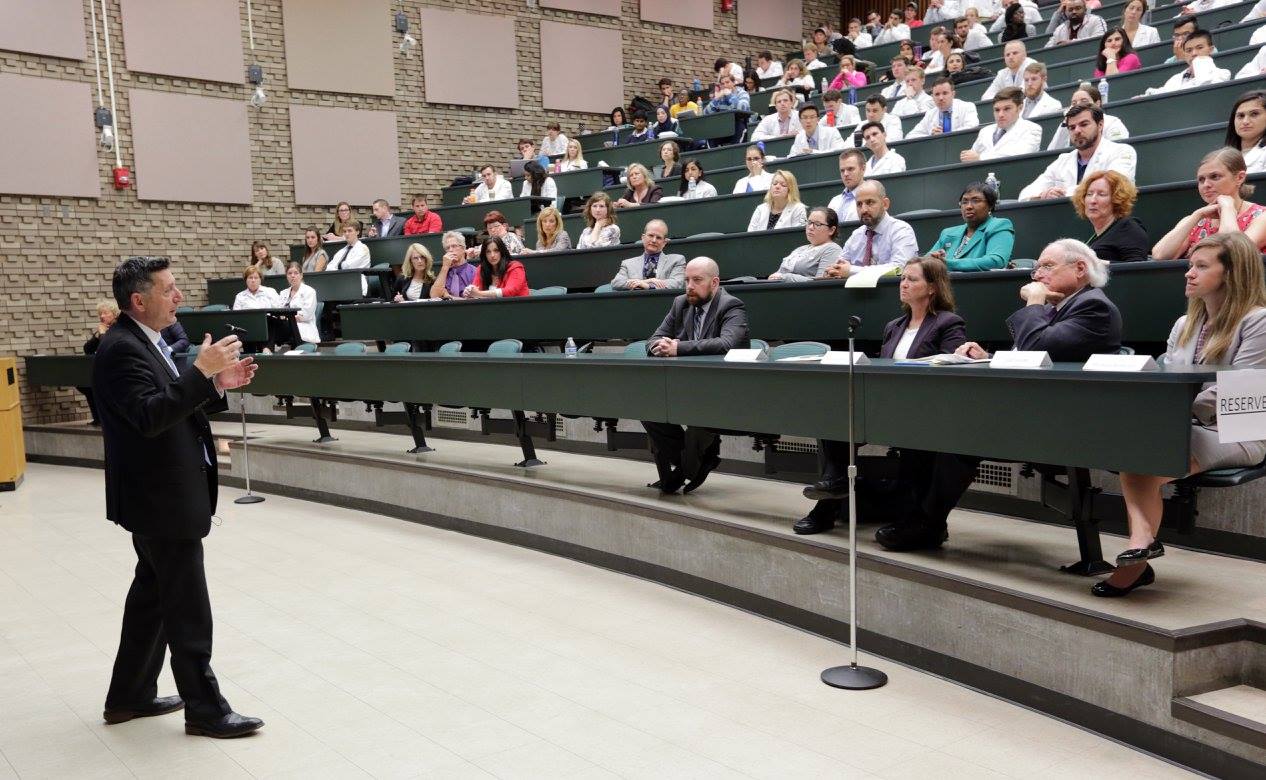
A White House official visited the Wayne State University School of Medicine on Tuesday as part of a national initiative aimed at increasing awareness of opioid addiction and new treatment alternatives for health professionals and students.
Michael Botticelli, director of the White House Office of National Drug Control Policy, spoke to an audience of about 150 medical, law, nursing, pharmacy and social work students and faculty. Botticelli provided an overview of the opioid crisis in the United States, which he said started in 1999 and continues to grow. More than 28,000 died of an opioid-induced drug overdose in 2014, the most recent year data was available. About four people a day overdose from opioids in Michigan, he said. Only 10 percent of the 23 million Americans who meet addiction guidelines get treatment.
"We have to change the culture mindset of addiction," he said. "Advocacy works. We need professionals to lean in on addiction services."
Opioids refer to addictive medications that relieve pain by switching off pain receptors in the brain, and can include hydrocodone, oxycodone, morphine, codeine and heroin.
"It's about the same mortality we saw at the height of the AIDS epidemic," he added. "We are in the middle of an epidemic."
In response to a national initiative lead by Botticelli and President Obama, WSU pledged to strengthen its curriculum to better prepare health professions students for work with those who have substance abuse disorders. Curricula updates include more treatment education and tools to address increased challenges in prescribing controlled substances. A cross-disciplinary task force of faculty from several WSU schools and colleges was formed to shape addiction treatment in the curriculum.
"Our mission is clear on this issue. Wayne State University is an urban institution whose role is to ensure you have the education and training to make an exceptional impact on the health and wellness of your patients," said WSU Provost Keith Whitfield.
The lecture, a special session of the School of Medicine's LEAD program (formerly Medicine and Political Action in the Community), was followed by a question-and-answer session with Botticelli, a recovering substance use addict with 28 years of sobriety.
He is a vocal advocate for increased access to Buprenorphine, which can be administered by general practitioners in a private medical environment and is an alternative to clinic-administered Methadone.
Botticelli was introduced by retired U.S. Sen. Carl Levin, who is now chair of the Levin Center at Wayne Law. Levin and U.S. Sen. Orrin Hatch, R-Utah, co-wrote the Drug Addiction Treatment Act in 2000, making it legal for a limited number of physicians to prescribe Buprenorphine, a drug that helps block the craving for heroin. The Food and Drug Administration approved its use in 2002. The government has also increased the number of doctors who can be certified to administer it. But for patients in many areas, especially rural regions, there is little to no access to physicians or other health care professionals trained to prescribe the drug.
"We have a shortage of certified doctors. That's where you come in. We've got to get rid of the legal barrier, and the leader of this fight in Washington in Michael Botticelli," Levin said. "This is a man who has personal experience with addiction and is committed to treating it like it is any other illness."
The national initiative encourages health professions students to help destigmatize addiction and play a more proactive role with patients who may be former, current or potential addicts. He recommended the students avoid using words such as "abuser" and "junkie."
"You will be dealing with people day in and day out who have a substance addiction. Don't operate from a place of denial. Treat people with dignity and respect. They often feel judged by the medical community," Botticelli said.
Under his direction, the Office of National Drug Control Policy has taken a balanced approach to drug control focused on prevention, treatment, recovery and criminal justice reform. New pain-management measurement questions are being field-tested, and the National Institutes of Health has published a compendium of recommended non-opioid pain therapies.
"Prescriber education is one of those initiatives," he said. "We don't want the automatic response to be pain medicine."
Diagnosis, at one time more of a mental health professional's responsibility, is beginning to migrate further upstream to primary care practitioners who often can diagnose the addiction before it becomes acute and chronic, Botticelli added.